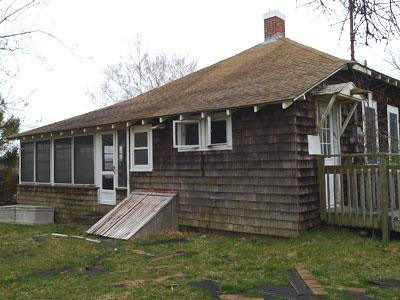Montauk’s Fort Pond House Still for Sale

East Hampton Town’s Fort Pond House, which sits on four acres and provided, with the exception of a boat launching ramp, the only public access to the pond, will remain for sale despite a lack of viable offers and a recent attempt, for the second time, by the town board’s two Democrats to withdraw it from the market.
The possibility of selling the house, which was used by community groups, drew strong vocal opposition and caused two lawsuits.
On April 16, Town Councilwoman Sylvia Overby offered a resolution to cancel the sale. Supervisor Bill Wilkinson had initiated the sale in 2010, noting the town needed the cash. Since then, with the town addressing a deficit that had accumulated during the previous administration, budget surpluses have begun to accumulate.
Ms. Overby’s proposal drew instant criticism from Mr. Wilkinson, who, along with Councilwoman Theresa Quigley, voted against keeping the land. Councilman Dominick Stanzione abstained, leaving it a tie.
“Is there a double jeopardy here at Town Hall?” Mr. Wilkinson asked. “Can a board constantly bring up the same subject?”
A previous vote on canceling the sale, Councilman Peter Van Scoyoc pointed out, also was tied. “At this point, we don’t need to sell it. It is an asset for the people of Montauk and the town,” he said, noting that a number of groups would like to use the site. “It is the town’s only access to Fort Pond. Frankly, it’s costing us money just sitting there in limbo — and the potential legal bills.”
One of the lawsuits, a federal constitutional rights case against Mr. Wilkinson and Ms. Quigley, who were accused of retaliating against opponents of the sale, has been settled. The town is still defending itself in the other, which claims the property, as parkland, cannot be sold without state legislative approval.
“Because the town is doing better or worse, you don’t change your financial analysis,” Mr. Wilkinson said. “The problem is, the reason you guys get into financial messes is there were no disciplines,” said Ms. Quigley. She said the Fort Pond property was purchased “for the specific purpose of land banking — to sell later for financial needs. We need to shore up our finances.”
The ongoing lawsuit has cost the town at least $30,000 so far, Ms. Overby said, and another attorney, Anthony Tohill, has just been hired to respond to it.
“I have no problem in spending money on outside counsel to defend some rights of the town,” Mr. Wilkinson said.
Ms. Overby said the board had not received any offers to buy the property, but Mr. Wilkinson countered that there had been some. “But I didn’t think it was high enough,” he said.
“We’ll probably bring it up again at some point,” Mr. Van Scoyoc said after the vote. “I’m sure you will,” Mr. Wilkinson said.
The property was purchased for $890,000 in 2003. It is listed by Halstead Property for $2 million, with Cornelia Dodge and William Kuneth as the brokers. A board vote to accept an offer on the property would be subject to permissive referendum, forcing a public vote on the issue should enough voters sign a petition supporting one.
